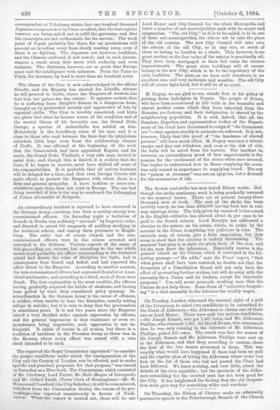The Scotch coal-strike has now lasted fifteen weeks. Bat though
the strike continues, work is being gradually resumed on the masters' terms. There are at present twenty-three thousand men at work. The cost of the strike has been terribly heavy, no less than £362,000 having been lost in rail- way earnings alone. The help given by means of levies raised in the English collieries has allowed about 4s. per man to be• paid to the Scotch miners. Lord Rosalyn has addressed a circular to the miners on his estate, which, to judge by the account in the Times, is anything but judicious in tone. The extracts may, of course, give a false impression, but they seem to show that the circular is unduly threatening. The masters' best plan is to state the plain facts of the case, and let the men draw the inferences. Especially unwise is the general attack on the Unions, which is conveyed in the fol- lowing passage :—" He adds," says the Times' report, " that• when peace shall have been restored, he doubts not that the formation of a Conciliation Board will not only have the effect of preventing further strikes, but will do away with the- necessity for a Union and its leaders, except for charitable purposes." You will never persuade working men that the Unions do not help them. Some form of "collective bargain- ing " is a vital necessity to the labourer for weekly wages.






































 Previous page
Previous page